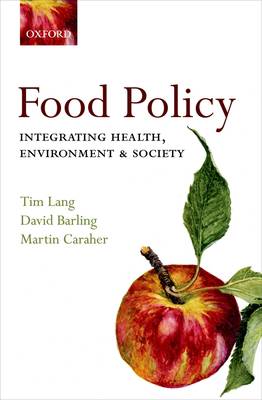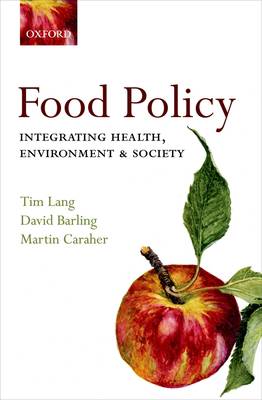
- Retrait gratuit dans votre magasin Club
- 7.000.000 titres dans notre catalogue
- Payer en toute sécurité
- Toujours un magasin près de chez vous
- Retrait gratuit dans votre magasin Club
- 7.000.000 titres dans notre catalogue
- Payer en toute sécurité
- Toujours un magasin près de chez vous
Food Policy
Integrating Health, Environment and Society
Tim Lang, David Barling, Martin Caraher
Livre broché | Anglais
122,95 €
Description
For over half a century, food policy has mapped a path for progress based upon a belief that the right mix of investment, scientific input, and human skills could unleash a surge in productive capacity which would resolve humanity's food-related health and welfare problems. It assumed that more food would yield greater health and happiness by driving down prices, increasing availability, and feeding more mouths. In the 21st century, this policy mix is quietly becoming unstuck. In a world marred by obesity alongside malnutrition, climate change alongside fuel and energy crises, water stress alongside more mouths to feed, and social inequalities alongside unprecedented accumulation of wealth, the old rubric of food policy needs re-evaluation. This book explores the enormity of what the new policy mix must address, taking the approach that food policy must be inextricably linked with public with public health, environmental damage, and social inequalities to be effective. Written by three authors with differing backgrounds, one in political science, another in environmental health and health promotion, and the third in social psychology, this book reflects the myriad of perspectives essential to a comprehensive view of modern food policy. It attempts to make sense of what is meant by food policy; explores whether the term has any currency in current policy discourse, assesses whether current policies help or hinder what happens; judges whether consensus can triumph in the face of competing bids for understanding; looks at all levels of governance, across the range of actors in the food system, from companies and the state to civil society and science; considers what direction food policies are taking, not jsut in the UK, but internationally; assesse who (and what) gains or loses in the making of these food policies; and identifies a modern framework for judging how good or limited processes of policy making are. This book provides a major comprehensive review of current and past food policy, thinking and proposing the need for what the authors call an ecological public health approach to food policy. Nothing less will be fit for the 21st century.
Spécifications
Parties prenantes
- Auteur(s) :
- Editeur:
Contenu
- Nombre de pages :
- 320
- Langue:
- Anglais
Caractéristiques
- EAN:
- 9780198567882
- Date de parution :
- 25-05-09
- Format:
- Livre broché
- Format numérique:
- Trade paperback (VS)
- Dimensions :
- 231 mm x 155 mm
- Poids :
- 493 g







